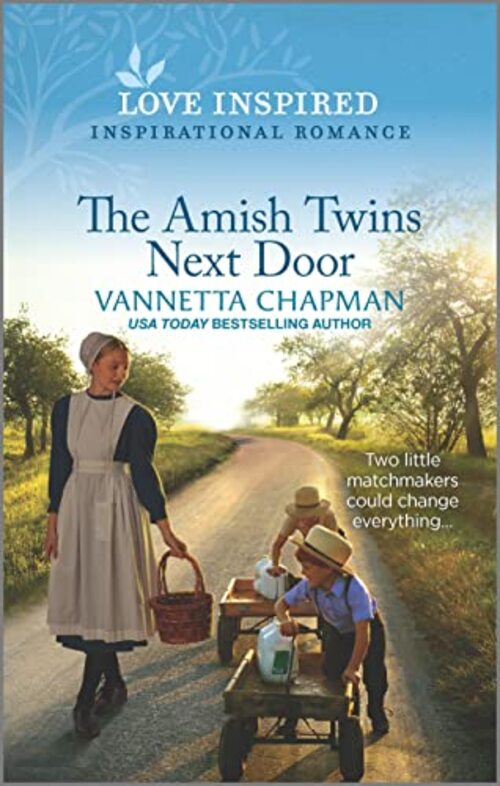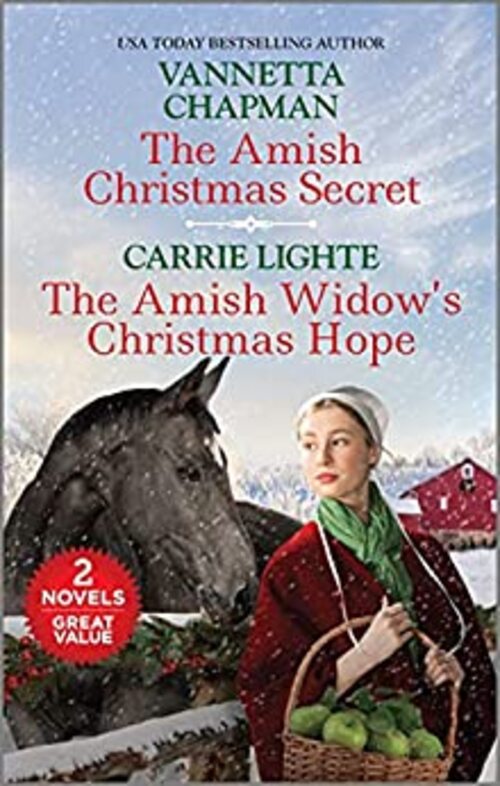Susannah Beiler was carrying a to-go bag holding half of a cinnamon roll in one hand and her coffee in the other when she stepped out of Cabin Coffee and started across the street. At that exact moment, a large Ford pickup truck careened to the curb. Her friend Deborah pulled her back with a laugh and a smile. “Wouldn’t do to have you flattened on the streets of Goshen on this beautiful spring day.”
After all she’d been through the last two years, it would be ironic. Susannah shook off that thought and would have walked across the street that was now clear, but Deborah stepped back under the canopy of the coffee shop and nodded toward the truck. “Do you ever wonder why people act like that?”
The music was blaring at such a high level that the ve¬hicle was practically rocking. The truck sported a bright blue paint job with streaks of lightning painted down the side, a large chrome bumper and spinning tire rims.
“Why would you jack it up so high?” Susannah crossed her arms, tapping her right index finger against her left arm. Sometimes she felt like she didn’t under¬stand other people at all.
“And who would want to purchase such big tires? They look as if they’d fit a tractor.”
“Ya, I’m not sure what the point is.”
They glanced at one another when a young man jumped out of the truck, empty fast-food bags and soda cans trailing after him. He noticed the girls, smiled in a cocky Englisch way and then realized they were staring at the litter that had escaped from the truck.
“Oops.” He snatched up the trash and tossed it into an adjacent trash can before once again flashing them both a smile.
He was a bit taller than Susannah, but then, most men were. He was also built like the mule her dat kept to watch over the goats—stocky and muscular. Blue jeans, a T-shirt that sported the logo of some rock and roll band, and sandy-colored hair flopping into his eyes and curl¬ing at his neck completed the picture.
Deborah laughed, but Susannah shook her head.
She couldn’t abide rude people, and this guy seemed oblivious that the truck was obnoxious and the music was too loud.
The driver of the truck had put the vehicle into Park and jumped out. He had bright red hair sticking out from his ball cap, but other than that he could have been a twin to the first guy. As Susannah and Deborah watched, he walked up to his buddy, and they performed some com¬plicated handshake.
“Take care, man.”
“You know it.” The first guy reached into the truck and snatched out a ball cap and a faded backpack.
“Later.”
“Much.”
The driver hopped back into the truck and sped away. The sandy-haired guy winked at Susannah and Deborah, pulled a cell phone out of his pocket and proceeded to stare at it as he walked in the opposite direction.
“Clueless,” Susannah said, rubbing at the brow over her right eye. “He’ll be lucky if he doesn’t fall off the sidewalk the way he’s staring down at that phone.”
“Maybe.”
“Are you kidding me?”
“I’m only saying that just because he’s different doesn’t mean that he’s bad.”
“I didn’t say he was bad.”
“Uh-huh, but the look you gave the both of them would have frightened a small child.”
“Really?”
“Definitely. You’ve always been able to do that—stop someone in their tracks.” Deborah linked their arms to¬gether and turned them toward her buggy. “Are you sure you don’t want to be a teacher?”
“I’m not sure of much, but I am sure of that.”
“Which is just as well, because you’re a fabulous quilter.”
“Danki.”
“Off we go to the fabric store, then.”
Which cheered up Susannah immensely. Even if she didn’t purchase anything, being around bolts of fabric had a way of encouraging her on the darkest of days. During the worst of her chemotherapy treatments, she’d often stopped into the local fabric store simply to enjoy the smell and touch of new fabric. When she was too sick to piece or quilt, she’d sometimes sit with a basketful of different-colored cotton swatches, dreaming of what she would sew as soon as she was better.
There was something about brushing her fingertips over the cotton, envisioning the pattern she would use and the quilts she would make and picturing the smiles on tourists who purchased them. Quilting was her way of spreading joy, and wasn’t that what a person of faith was supposed to do?
Deborah was describing her dat having to battle his way through a thicket of thorny brush to free a goat that had managed to become ensnared. The goat had taken one look at Deborah’s dat and scampered off in the opposite direction, leaving him wondering why he’d thought he needed to save the animal in the first place. “‘Goats are resourceful animals, Deborah. Never forget it,’” Deborah finished with a spot-on imitation of her dat. She always could tell a good story, and they were both laughing by the time they reached the fabric store.
Susannah enjoyed the rest of the afternoon.
She forgot all about the Englischer.
And she arrived home humming a tune and feeling immeasurably better than she had when she had awak-ened that morning. Some days she still woke terrified that the cancer had returned, certain that she was about to be plunged back into the cycle of doctor’s visits and tests and treatments. Some days were still harder than others.
But her day had improved, and her mood had light¬ened with it.
“Mind fetching the mail for me?” Her mamm had been up since before sunrise—they both had. While Susannah did her best to help with household chores, her mamm often shooed her away, telling her to go rest or step out¬side for a while or spend an hour in her quilting room.
At the moment, her mamm’s apron was a mess, her hair was escaping from her kapp and her hands were covered in bread dough. Two loaves were already baking in the oven and two she’d finished kneading sat on the counter.
Sometimes Susannah wondered why they still made the bread from scratch, since loaves were certainly cheaper to purchase at the grocery store. She did love the smell of fresh-baked bread, though.
“And please take your schweschdern. They’re full of energy today.”
Sharon and Shiloh dropped the dolls they were play¬ing with and ran toward the front door.
“Sweaters first,” Susannah said. Though it was the last week of April, the afternoons cooled quickly. The twins reversed directions and ran for their cubbies. When the girls were born, her dat had placed cubbies in the mudroom with their names marked at a level they could now easily read.
“They sound more like puppies on the loose than chil¬dren,” Susannah said.
She adored her little schweschdern. Her mamm had been twenty when Susannah was born and forty when the twins came along. They were the siblings she never thought she’d have, and she prayed every day that they hadn’t inherited the gene that had caused her ovarian cancer. She didn’t want anyone else to have to endure such a thing, especially not her schweschdern.
“Like I said—full of energy. I wouldn’t mind if you stayed out with them a half hour or so, give them time to run some of it off.”
Susannah thought her mother was one of the most hardworking women she knew, but twin five-year-olds could wear anyone down.
“Finish that bread and then sit down with a cup of tea. I have a feeling you’ve earned it today.”
The twins catapulted back into the kitchen.
“I’m ready.” Shiloh reached for her hand.
“Me, too. I wonder if we have a letter from Mammi.” Sharon dashed to the front door.
“Don’t run too far ahead,” Susannah called out.
The girls looked identical—white-blond hair, blue eyes and a thin build. The only physical difference that was easy to spot was that Sharon had freckles and Shiloh didn’t. Their personalities were quite opposite. Sharon was always running ahead—energetic, enthu¬siastic and fearless. Shiloh preferred to hang back and carefully watch. She also liked holding hands, while Sharon proclaimed that was for babies.
By the time Susannah and Shiloh descended the front porch steps, Sharon was already waiting at the lane—hands on her hips, a scowl on her face and a whine in her voice. “Why are you so slow? Come on already.”
The day was one of those glorious spring days that Su¬sannah often daydreamed about in the winter. The leaves were a green so bright they caused you to blink, and the flowers planted earlier that month had burst into a rain¬bow of color. The sky was blue, the sun shone brightly and the weather was cool enough to require a sweater but without a cold north breeze.
Perfect.
They picked wildflowers as they rambled down the lane.
Both girls stooped to watch ants carrying tiny pieces of grass.
And they fed carrots to Percy, their buggy horse, who was grazing in the field that ran alongside the lane.
Susannah’s mind called up all the things she had to be thankful for—her family, her health, a community that had supported her through a difficult time and now a perfect spring afternoon.
Ten minutes later, they reached the mailbox. Susannah had her hand inside, trying to reach to the back, where it seemed at least one piece of mail always managed to land, when Shiloh stepped closer and Sharon began to bounce from foot to foot.
“Someone’s coming,” Sharon said.
Susannah shielded her eyes against the afternoon sun, at first curious and then disbelieving and finally com¬pletely confused. What was he doing here?







